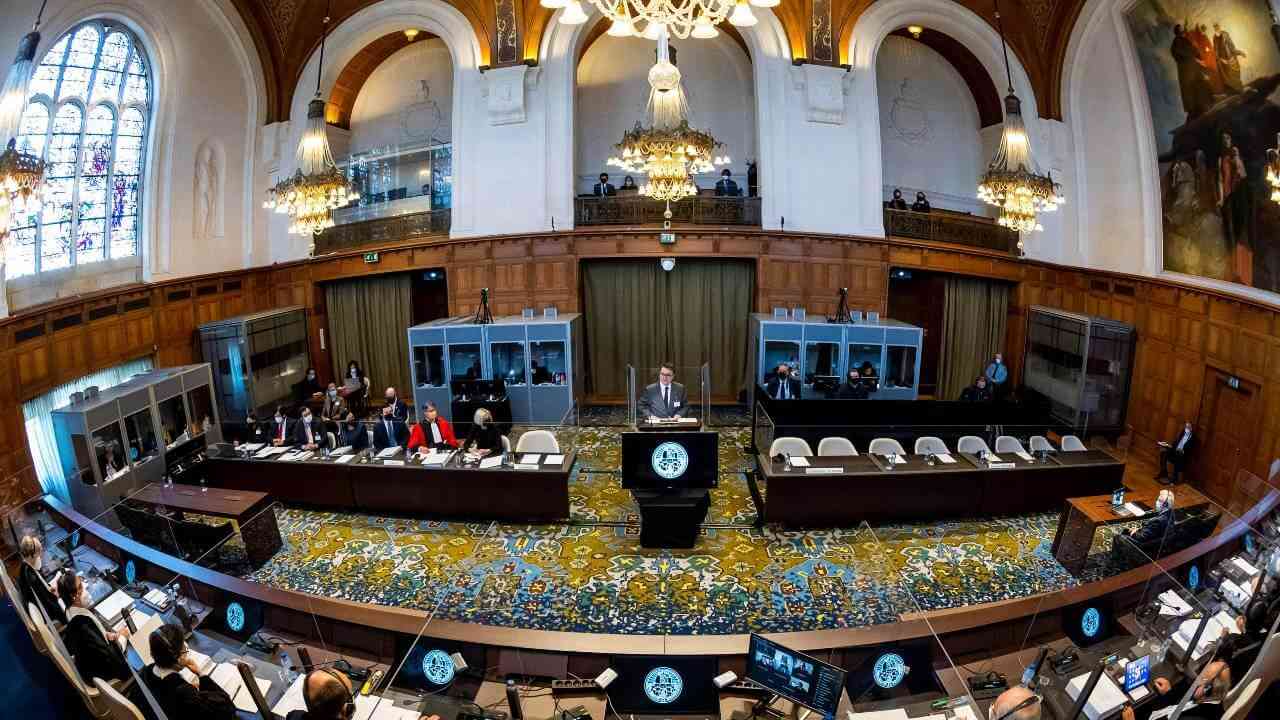As the Russian invasion of Ukraine rumbles on, evidence of Russian war crimes grows. US Secretary of State Antony Blinken told CNN that the US has “seen very credible reports of deliberate attacks on civilians, which would constitute a war crime. [The US] have seen very credible reports about the use of certain weapons”. Meanwhile, President Volodymyr Zelenskyy’s government has begun to seek legal accountability for violations of International Law.
It has submitted an application against Russia in the International Court of Justice (ICJ), for falsely alleging genocide to justify the invasion of Ukrainian sovereign territory. The first hearing took place on March 7, with Russia refusing to send representatives. The ICC (International Criminal Court) has opened a probe into possible crimes in Ukraine after 39 state parties sent it referrals. On March 2, the ICC announced the commencement of an official investigation. President Zelenskyy has meanwhile called for the establishment of an international tribunal, highlighting that the evidence that is accumulating can be used to prosecute violations of International Humanitarian and Human Rights Law (IHHRL).
A website has been jointly created by the Office of the President of Ukraine, along with the body responsible for affairs in occupied Crimea, and the justice and foreign ministries. This aims to collect evidence for the protection of and representations by Ukraine in the European Court of Human Rights (ECHR) and the ICJ.
As each of these mechanisms progresses, and others such as a Special Tribunal possibly get added, the evidence collection challenge that they face is unprecedented. The complexity and multiplicity of the evidence (with more being generated every hour) requires a monumental effort. We are watching live online as alleged crimes are committed by Russian forces. Efforts are underway, but will inevitably command fewer resources in comparison to diplomatic and military work. Even so, the international community must make clear it will ensure that Russia and Belarus are held accountable, both through public statements and by evidence collection support.
The evidentiary complexity and volume may present a challenge to prosecutors in the future, but work must nonetheless be pursued before evidence is lost. The speed at which evidence is building up, the connectivity of the general population, and the multiple fronts with a wide geographical spread of warfighting, are all factors feeding into the immense challenge facing investigators. Additionally, significant elements of this body of evidence may be contained within the classified intelligence documents of sovereign governments, presenting an additional challenge that prosecutors also had to face when dealing with crimes in Bosnia. Some of the relevant categories of evidence where international support — including likely significant investment and marshaling of specialized human resources — will be required include, though are not limited to, the following:
- Satellite imagery
- Communication intercepts
- Metadata intercepts from apps, photos, and online activity
- Call detail records
- Open-source intelligence and social media archives
- Medico-legal forensics pertaining to human remains, including an antemortem and DNA database to assist identification of missing persons
- Ballistic and munitions forensics
- Standard criminal forensics
- Witness testimony collection and archiving, including specialized categories of testimony collection and preservation, such as in cases related to sexual and gender-based violence.
The forensic architecture to support the successful prosecution of alleged perpetrators will be monumental and complicated, adding another argument for a fast start. The international community must provide investigators, technical experts (from fields such as classic criminology, war crimes investigations, to metadata, archivists, and cyber security experts). It must also provide people on the ground to begin collecting witness testimony.
This effort must also ensure the technical elements of storing and protecting evidence, by supplying not only the physical capabilities and software but also cyber-security expertise. The mass collection of evidence being shared online requires dedicated verification experts. Furthermore, Russia has demonstrated its cyber expertise, and any Special Tribunal or organization working for accountability are sure to become high priority targets for state and non-state cyber groups. The UN mechanisms for evidence collection currently operating for Syria and Myanmar provide strong technical and procedural antecedents for such an effort.
Ukraine is still under attack in a fierce fight to retain control of its main cities, and faces a growing humanitarian crisis. It cannot be expected to carry the burden of all the necessary evidence collection and secure storage. The international community must support Ukraine in developing the human and technical resources that will ensure collection meets evidentiary standards. We must begin to catalog the crime scene in Ukraine. Evidence delayed is evidence lost.
Joanna van der Merwe is a Fellow at the Center for European Policy Analysis (CEPA) and holds an MA from Leiden University. She conducted her research in collaboration with the Land Warfare Centre of the Netherlands Ministry of Defense.
Nathaniel A. Raymond is a Lecturer at the Jackson Institute for Global Affairs and holds a second appointment as a Lecturer of Epidemiology (Microbial Diseases) at the Yale School of Public Health. His research interests have focused on the human rights and human security implications of information communication technologies (ICTs) for vulnerable populations, particularly in the context of armed conflict. @nattyray11




